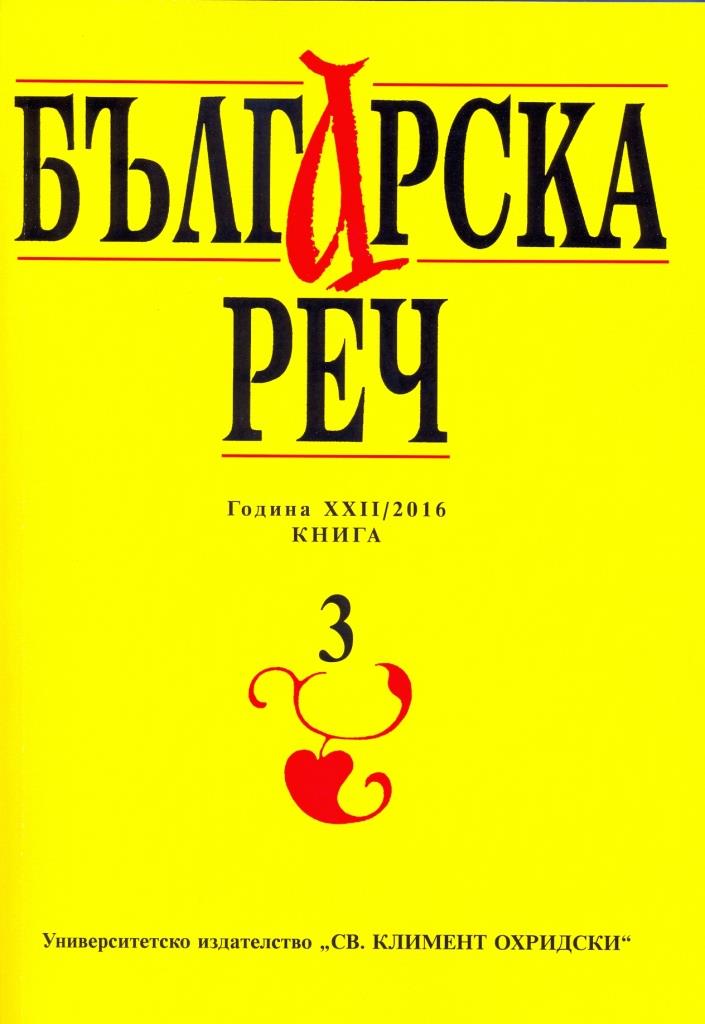
We kindly inform you that, as long as the subject affiliation of our 300.000+ articles is in progress, you might get unsufficient or no results on your third level or second level search. In this case, please broaden your search criteria.

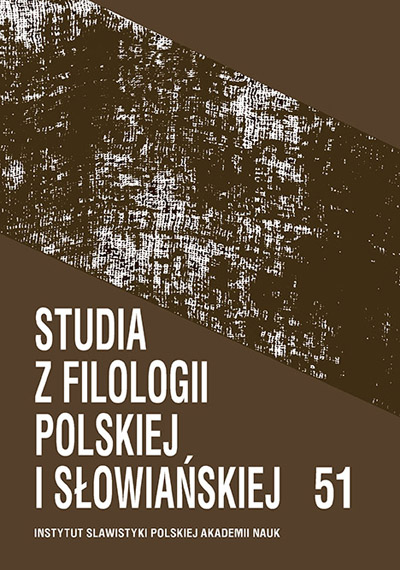
The paper covers various deviations from rules and anomalies in syntactical constructions of the Russian language, lacunas in syntactic paradigms determined by a number of covert categories (cryptotypes). Among the covert categories that are revealed based on an analysis of atypical syntactic usages or syntactic gaps which I dub “syntactic prohibitions” are: controlled vs. uncontrolled actions, dependence vs. independence, activity vs. inaction, and version. One of the sources allowing to identify these syntactic gaps have been erroneous Russian sentences constructed by foreign students of Russian. Covert categories of the Russian language have usually been discovered by comparison with overt categories (phenotypes) in other languages. The present article offers a preliminary analysis of the use of lacunas in syntax paradigms as another method, besides the comparative one, of revealing covert categories in Russian.
More...
The article is devoted to chosen titles and subtitles in Slovene-language popular science texts about Slovene history. The data comprise 110 examples taken from the three Slovene popular science books. The analysed phrases have different forms (nouns, adjective-modified nouns, nominalizations). The conducted study is methodologically based on semantic and syntax analysis – the analysis of the ways of realization of the predicate-argument structure on which a given initial para-text is founded – as applied in the context of textual analysis of scientific, and especially popular scientific, discourse. The author of the article investigates the relation between the given title and the content of the corresponding portion of the macro-text. Particularly interesting are titles formed by means of nominalization, that is to say – by means of a transformation of predicate-argument structure. When used as titles, nominalizations confirm their expected semantic and syntax features, such as the capacity for the omission of chosen elements, increased generality and the same time compactness of the message. They also proved fruitful elements of the strategies of macro-text construction based on using appropriate titles.
More...
This article deals with a particular type of simple sentences with a complex predicate which includes the demonstrative pronoun Pol. to / Russ. это ‘this.’ The author presents the view, prevailing in the linguistic literature, that in terms of syntactic structure, such units perform the role of the so-called copula. The analysis of linguistic material of modern Russian and Polish (taking into account the category of functional syntax) leads to the conclusion that such instances are in fact cases of subject duplication, which is used to emphasise the subject in spoken language.
More...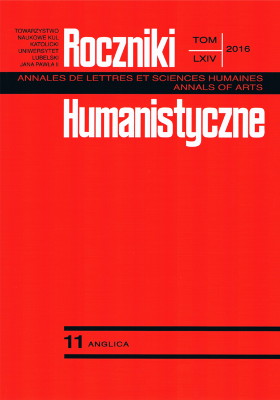
The aim of this paper is to identify the syntactic position of the comparative operator tak. First, we present a classification of degree phrases as proposed by Neeleman, van de Koot and Doetjes (2004). The authors divide degree expressions into two classes, namely class-1 and class-2 degree expressions. The expressions of the first class function as heads while expressions of the second class form a group of maximal projections. Only the former but not the latter c-select prepositional phrases, nominal phrases with a gradient property and verbal phrases. Since class-2 degree expressions are adjuncts, they can have a rich internal structure and appear without the host element. As for the movement, only class-2 degree expressions can undergo leftward movement. In the paper we demonstrate that comparative tak looks like a class-2 degree expression in contrast to its English counterpart in an analogical construction, i.e. the comparative as. The crucial difference between English and Polish degree expressions is the fact that in English the dummy operator much appears only in a limited number of contexts while its Polish equivalent, i.e. bardzo, is very common among degree expressions from class-1. This observation does not allow us to adopt Neeleman et al. (2004) syntactic analysis of degree expressions without any modifications.
More...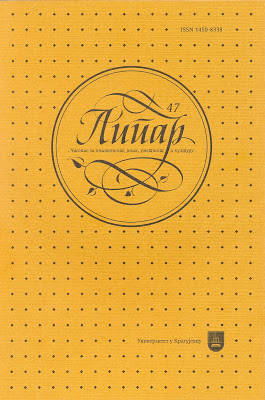
This paper considers the nature of tense meaning. Section 1 sets the scene by introducing the traditional approach to tense (and aspect) that is advocated in the semiotic model of communication as exemplified in some renowned grammar books and in two influential, semantically-couched, proposals (Reichenbach’s tense system and Vendler’s situation types). Sections 2 and 3 present and discuss two alternatives to the traditional approach: the Natural Semantic Metalanguage, a radically-semantic approach, and Relevance Theory, a radically-pragmatic approach. The two contemporary theoretic frameworks are employed to show how the time-tense(-aspect) information may be approached and analysed in order to gain a fuller insight for both theoretic and applied purposes. Section 4 ends on the author’s note on the relevance of her exposition.
More...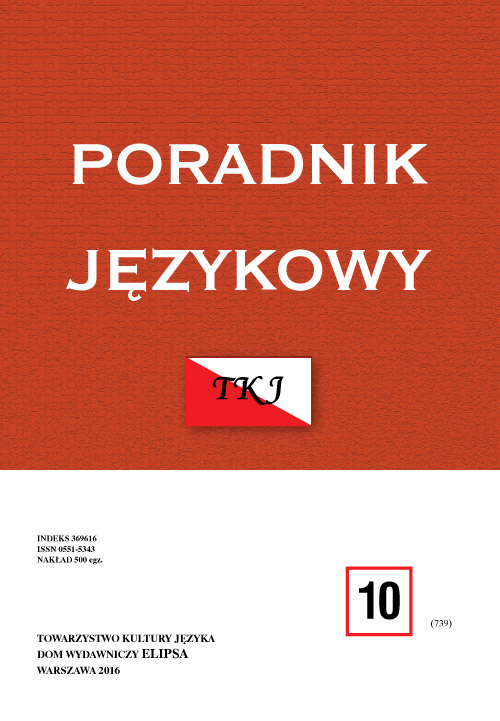
The main subject area of this study is intergenerational confrontation of the lexical resource of pre- school children. The two generations in question are “parents”, that is people who were children in the period 1980– 1983, and “children”, which is the generation of pre- schoolers in the period 2010– 2015. Frequency dictionaries were developed for both generations on the basis of corpora of spontaneous utterances of children. A comparative overview of both lists permits identification of strictly quantitative changes (the dictionary of 2015 contains ca. 1,000 entries more than the previous one) as well as ones related to social conventions and development of civilization, which are useful in thorough linguistic and psycholinguistic research. This is the basis for indication of two children’s worlds separated from each other with a thirty years’ generational caesura, detection of (lexical and grammatical) linguistic creation areas. What is common for both frequency lists is the regularity consisting in the fact that the list of ten most frequent entries (usually synsemantic words) constitutes ca. 25% of all that were used in samples of 100 thousand, which is the so- called text coverage percentage.
More...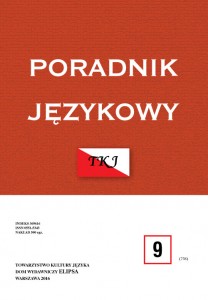
The sentence cited in the title begins the novel Zazdrość i medycyna (Jealousy and Medicine) by Michał Choromański, which was published in 1933. This paper aims at demonstrating that this initial statement can be considered a model one, that is a very good beginning to an epic work. Having studied the characteristics desired in an initial sentence (enumerated in both theoretical studies and style guides) and carried out stylistic and semantic analysis, the author found M. Choromański’s statement a model one. The contributing elements are as follows: 1. euphonic (the melody of the sentence manifested in a clear caesura nearly exactly in the middle in terms of the number of syllables and in classical proportions between vowels and consonants); 2. syntactic (word order and the related distribution of individual parts of the sentence, dynamism of the statement); 3. semantic (introducing the reader to the centre of extraordinary events, drawing their attention and enforcing their refl ection); 4. graphic (isolating the initial statement in a paragraph). Only the lexis of the examined sentence remains neutral.
More...
Different functional styles of the standard language are used in everyday linguistic practice. They higher use is the administrative functional style, and by nature of the matter, the least used is the literary mainly used by writers when creating the literary works, which makes it the style that is farthest from the linguistic standards. In contrast to this situation and the needs in practice, in our schools, especially is secondary education, the most attention in written statements is paid exactly to the very style that is rarely used by anyone else but by the writers. In this paper, through several examples, we warn about this problem, concluding that appropriate attention should be given to the stylistic register of a standard language as a whole, especially to those parts that are of practical importance, such as administrative writing, at all levels of studying the standard language, because without this knowledge, there cannot be nourished culture of speech applicable in practice.
More...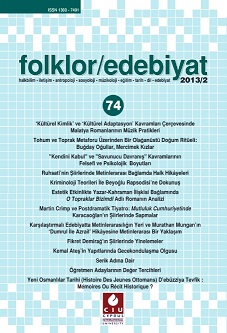
Karacaoğlan is a leading figure in folk literature. His rising voice in Anatolian Geography since 16th century, sometimes a agreeable melody, sometimes was embroidered into hearts emotionally charged as a string. In this study, Karacaoğlan’s poems, were aggregated by Müjgân Cunbur, were examined in terms of linguistic deviations. As a result of this study created by description technique; It can be seen that the poet gravitated to some searches to provide the elements of harmony (rhyme, measure compliance) and gave a place solecistic vocable elements. Variations have been identified exemplary use of morphological, lexical, semantical, syntactic and local dialect in the studied poems. Sometimes it can be seen that the poet has reduced attachments (case suffixes of name, possessive suffix, tense and modality suffix) also sometimes used that language particles in accordance with the rules of language in the formal variations To about lexical variation, it is determined that the poet moves with artistic concerns and gives place to original or modified statements. Karacaoğlan tries hard linguistic harmony as well as to catch semantic integrity in his poems like all poets. But while sometimes this poetic concerns conductive to strong meaning, the emergence of a deep metaphor, sometimes leads to the emergence of obscure, vague expressions. In terms of syntactic, it can be seen that the poet hasn’t kept to depend on “determinant+determinated” rule in places, has created his verses with a specific post predicate constituents. In the case of local uses, the poet tries to give a very colorful image. In his poem not only one; but also more than one region’s air is breathed. The poet sometimes speaks local dialect and sometimes goes to alteration these word values. As a result, it is possible to say that these deviations which are caused by artistic concerns ruin linguistic integrity in the poems on the other hand contribute to the beauty of articulation.
More...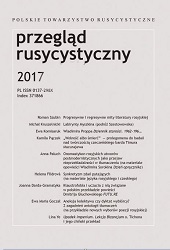
In linguistics, syncretism is understood as asymmetry of language sign, i.e. discrepancy between the content and form of language phenomena, which implies their ambiguousness. This point of view is applied in the article in order to scrutinize and classify Russian and Czech syncretic interrogative sentences which are characterised by means of interrogative form and the meaning of request or challenge (e.g. Ты мне поможешь/не поможешь?, Чего ты не работаешь?!) or the meaning of declarative statement (e.g. Можно ли мириться с этими недостатками?). Ambiguousness of syncretic interrogative sentences is resolved in the context of communitation. Implementation of theory of grammatical syncretism in Russian and Czech comparative point of view seems to be promising in future.
More...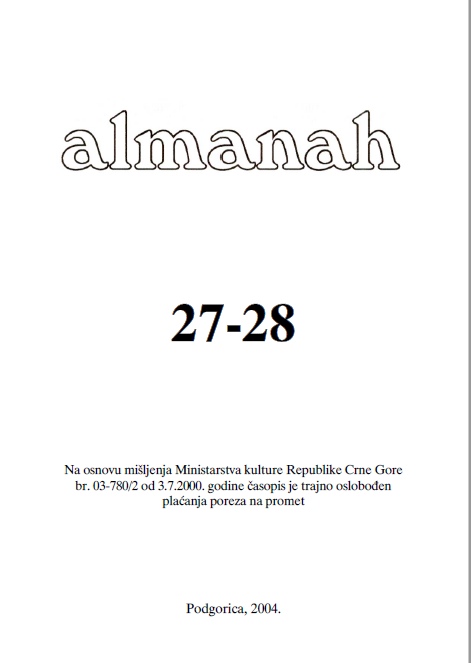
Govor staropodgoričkih muslimana ulazi u sastav širega istočnocrnogorskog dijalekta, ali se po nizu svojih osobenosti izdvaja u poseban ogranak ovog dijalekta. Na njega je uticao kako govor pravoslavnih sugrađana, tako i albanski jezik kojim se govorilo (i govori) u neposrednom susjedstvu Podgorice. Zajednički život muslimanskog i pravoslavnog stanovništva doprinio je tome da jezički uticaji budu obostrani, ali su podgorički muslimani ipak zadržali neke osobine koje su tipične samo za njihov govor. Podgorica je za vrijeme turske uprave uglavnom pripadala Skadarskom vilajetu i muslimansko stanovništvo koje je tada bilo najbrojnije prirodno je izgradilo i očuvalo niz svojih jezičkih osobenosti koje se nijesu razvile kod drugih nacionalnih grupa njihovog okruženja. Te jezičke karakteristike razvijale su se, naravno, u okviru jezika koji im je bio zajednički sa pravoslavnom podgoričkom populacijom jer su oni uglavnom slovenskog porijekla, pa su tim jezikom govorili i prije dolaska Turaka. Alija Nametak, koji je od 1933. do 1935.godine radio u Podgorici kao profesor Državne trgovačke akademije, u svome članku o običajima i tradiciji podgoričkih muslimana zapisao je: "Iako je ovuda prolazio važan put iz Albanije za Hercegovinu, ipak se ne opaža u narodnom životu uticaj ni šiptarskog ni turskog koliko crnogorskog".
More...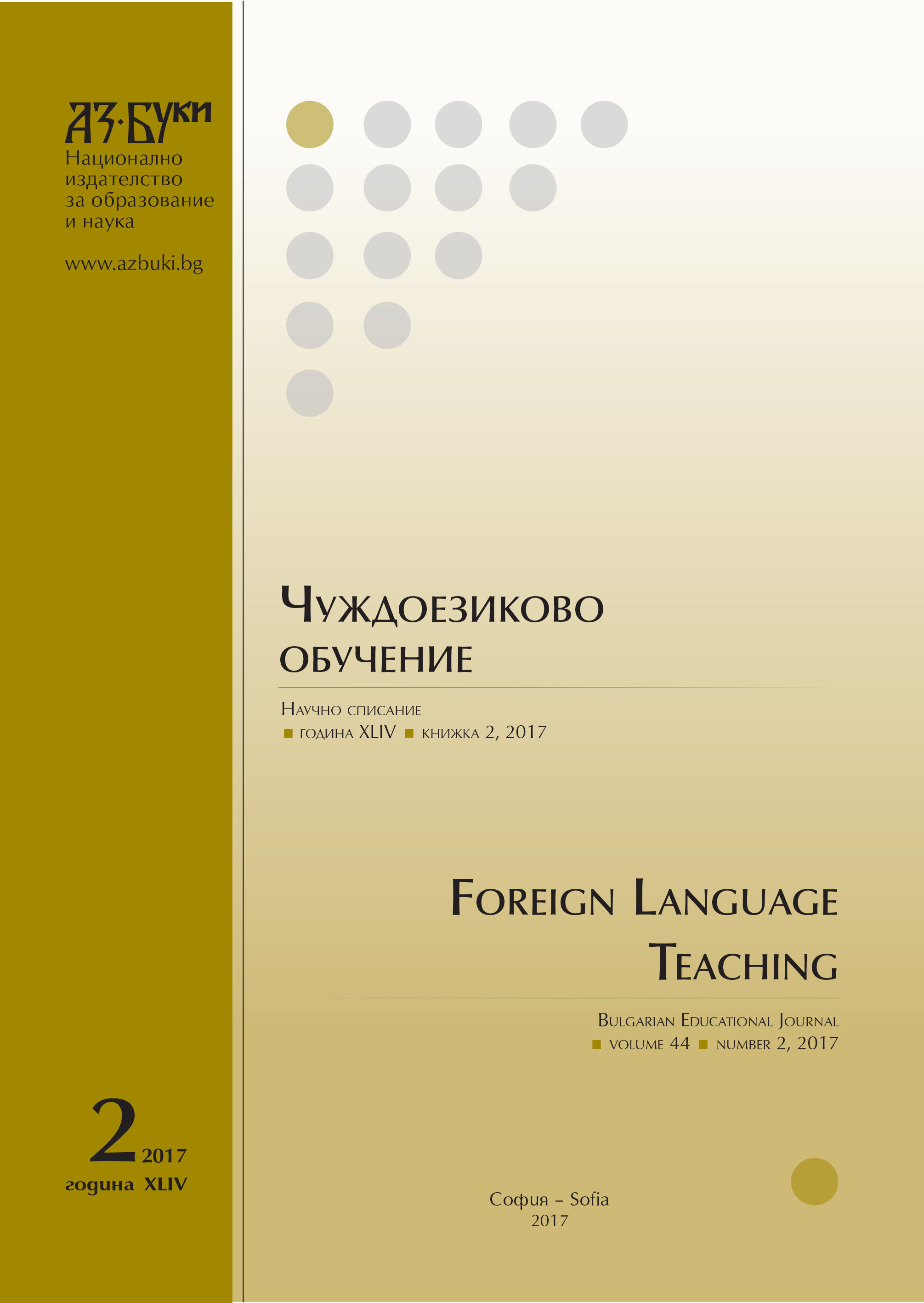
This article explores the model of language known as Organonmodel. The theory has historical value but the original ideas of Karl Bühler are a contribution to basic research on language. Bühler claims that functionality of language is one of three sources of human communication along with practical activity and social contact.
More...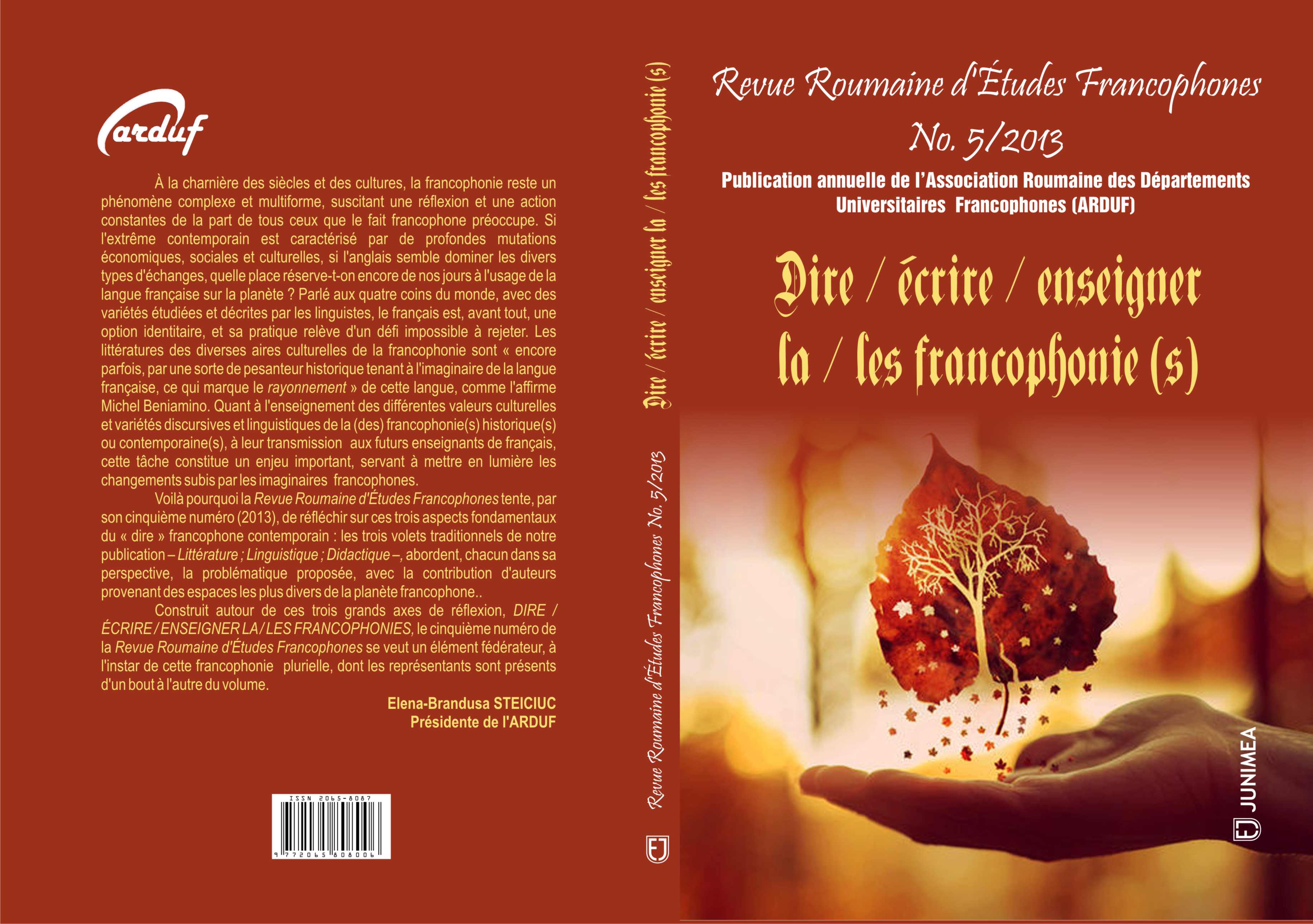
The verb « gérer », as used by Ivorians, shows particular syntactic and semantic characteristics compared to those of standard French. To understand this phenomenon, we studied the discourse of three categories of French speakers: pupils and students, semiliterate and illiterate speakers, and finally administration officials and university teachers. The analysis of oral corpus revealed a misuse of the verb « gérer », where other concepts are expected. In fact, speakers act as if these terms of standard French fail to explicitly reflect the sensitivity and the Ivorian culture. But this discovery produces rather rich neologisms. They show the same time the vitality of French in the country when each French-speaking community is struggling to legitimize its own customary practices.
More...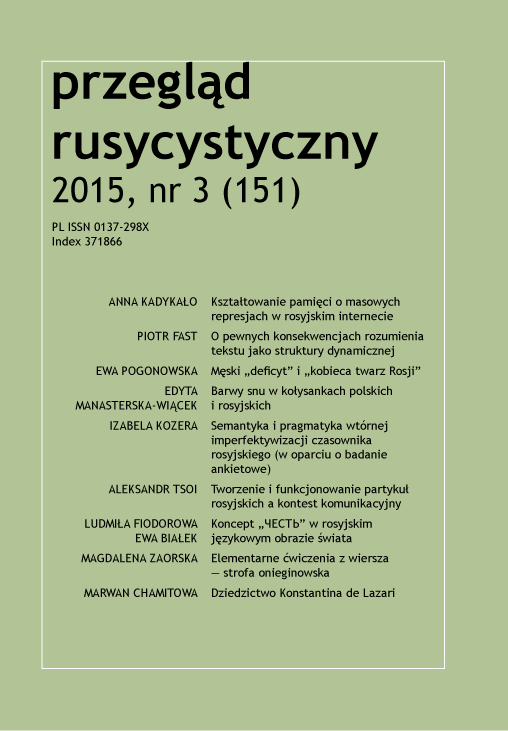
It is known that the function of particles as sub-marks lies in the actualization of the pragmatic part of an utterance or a sentence. The mark becomes a mark owing to its definite usage in the society: the pragmatic part of an utterance is the basis for determining the essence of the mark. In this connection in this connection question: what does the pragmatic component of a sub-mark or a syncategorematic word include? The analysis we have conducted shows that the pragmatic components of that has been Russian particle as a sub-mark are the distinctive and associative functions, but the communicative context performs the suggestive function
More...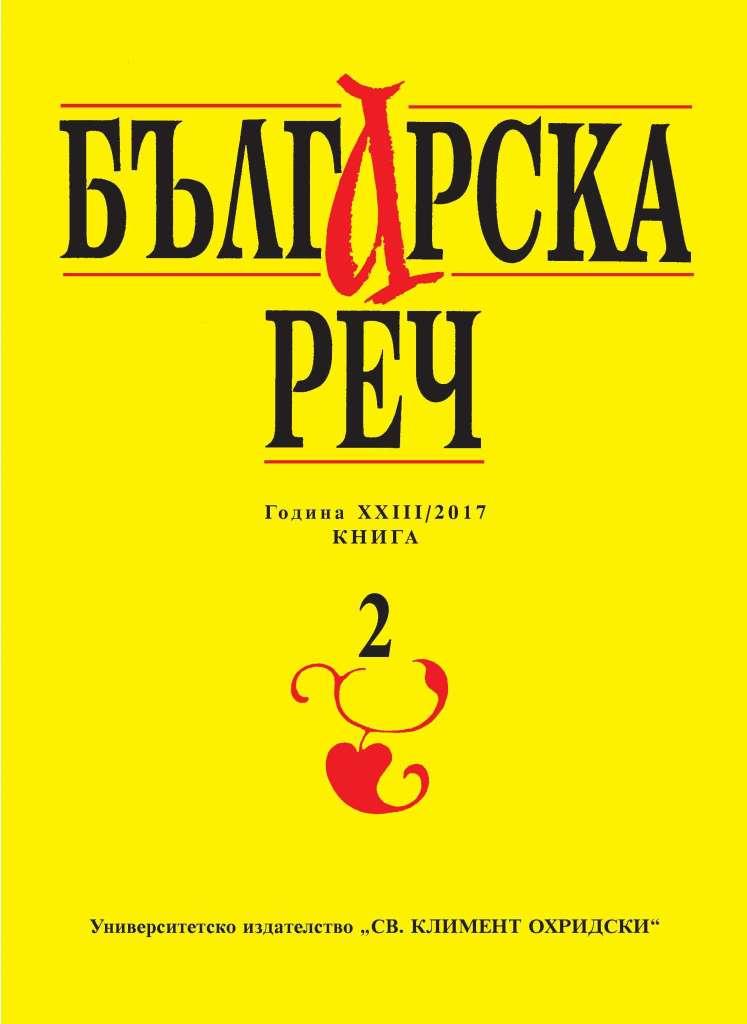
The article discusses errors and difficulties in language of the press that arise from the use of masculine gender nouns when referring to persons of female gender. Some of these cases are connected with semantics, others with syntax.
More...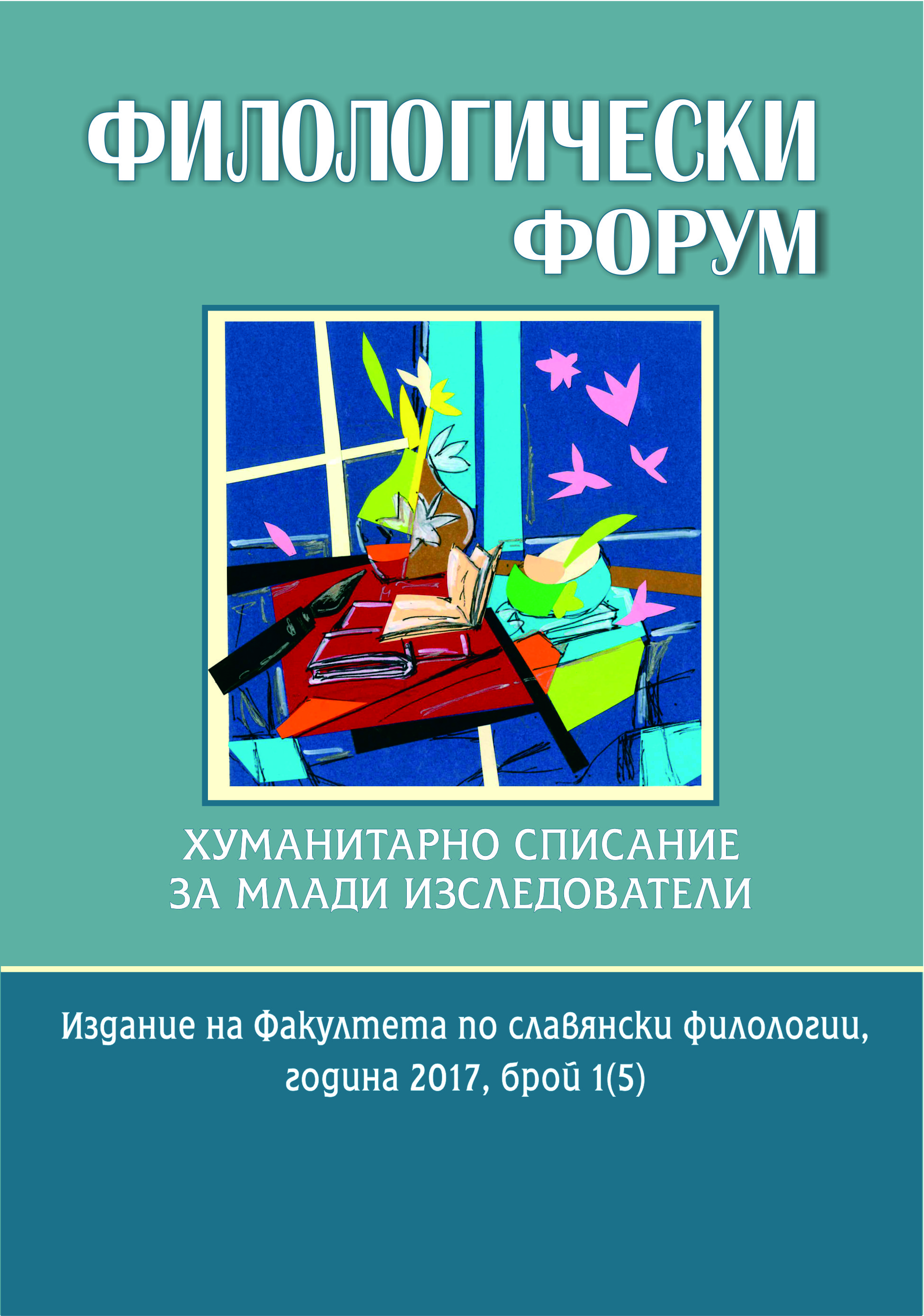
The paper deals with the word order specificities of adverbial modifiers of time and of place and direction on two levels: from the perspective of the formal as well as of the information loaded word order of the Bulgarian oral speech. The high frequency of the two types of adverbial modifiers in the Bulgarian oral speech is statistically proven.
More...
It is not very frequently assumed that negation may play an active role in achieving specific conceptual frames, but as claimed by Langacker (2008) or Lakoff (2004), language enables the actual physical presence of words, even if in some kind of a negative construction, to create the positive conception of what is being denied.Our research focuses on the phenomenon of praeteritio or apophasis as a rhetorical device in political discourse, where we noticed a frequent use of various types of negation constructions as introductory lines for the content which is actually not being negated but rather accentuated. Structures like ‘It goes without saying…’, ‘We don’t want to mention that…’, etc., which are then followed by actual descriptions of affected participants or events, have been spotted in our corpus of public political speech events, particularly in the media discourse and in other types of discourse involved in shaping public opinion.The cognitive and pragmatic functions of apophatic structures in the elicited corpus are analysed as well as their role in creating the persuasive force of this rhetorical device. Their iconic nature and psycholinguistic background are used as a vehicle to explain their unique position in the process of conceptualization of the world around us.
More...
The English verbal construction fail to x allows two interpretations: in the first, the verb has the full lexical meaning of not being successful in what you are trying to achieve, whereas in the second, it shows signs of semantic bleaching, and is thus interpreted as a grammaticalized marker of negation. Taking into account the syntactic and semantic properties of the construction fail to x, the present analysis examines its distribution in two types of corpora. General corpora (the British National Corpus and the Corpus of Contemporary American English) are used to examine the distribution of both – the non-bleached and bleached – meanings in English. To further elaborate the findings and contrast them on a cross-linguistic level, the parallel English-Slovenian corpus (European Commission’s DGT Translation Memory) is used to observe the translations of the construction fail to x into Slovenian. The parallel corpus of legislative language demonstrates the impact of register on the use of fail to x, and addresses the claims that the bleached fail is characteristically found in more formal reg-isters.
More...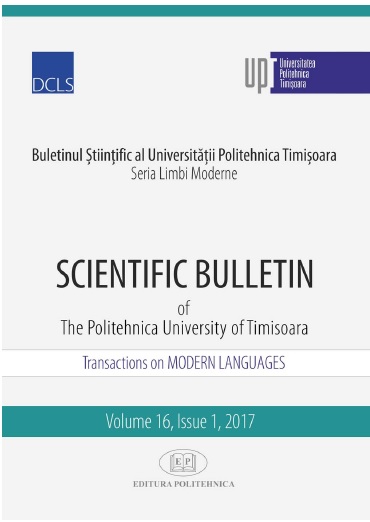
The present paper intends to raise awareness of the relationship between Thematic structure and translation and proposes ways to integrate it in class. It presents briefly the theory on Theme-Rheme within the Systemic Functional Framework. Then, it puts forward a class activity focusing on the application of the theory on text production. Not restricted only to translation students, this type of activity may help language students become better and more conscious text producers in any language.
More...